CONTACT: In Atlanta, Emily Staub
Phone: 1-404-420-5126
Email: Emily.Staub@emory.edu
MOSEBO, AMHARA REGION, ETHIOPIA....A remote Ethiopian village had cause for celebration today, as Jimmy and Rosalynn Carter, senior officials from The Carter Center, and Ethiopia Minister of Health Dr. Kebede Tadesse made a historic visit to commend the efforts of the Amhara Region to prevent trachoma, a painful and debilitating disease that causes blindness.
Community members performed a welcoming dance, village elders led a special ceremony for the health team - the reason was clear: in just one year of Carter Center trachoma control activities in the 2000-member village of Mosebo, 251 people have been treated for active trachoma, 41 patients have received surgery to treat trichiasis, and 367 households have built latrines to lessen infection risks. Additionally, 127 community volunteers have been trained on the World Health Organization's trachoma control guidelines, called the SAFE strategy, and the entire population will receive Pfizer-donated azithromycin in October, after the rains have ended.
Also present in the field were six Ethiopian Lions Clubs members, who were delighted to see the results of their support and partnership with the Ethiopian trachoma program.
The success of Mosebo in reducing trachoma offers hope for fighting the disease in other infected regions.
"There is no excuse for the unnecessary suffering caused by blinding trachoma," said Jimmy Carter, former US President and 2002 Nobel Laureate, during the field visit. "Simple interventions such as the construction of latrines to improve community sanitation can make a vast difference in the number of trachoma infections in endemic areas, as well as in the overall quality of life in these villages. While we cannot eradicate this devastating disease, we have the tools to eliminate the more serious complications of trachoma, such as blindness."
Trachoma is the leading cause of preventable blindness in the world and is endemic in poorer rural communities, where poverty is a significant barrier to reducing the threat of disease. Because trachoma can be spread by flies that breed in human feces, establishing the means for community sanitation significantly reduces the population of flies and, subsequently, trachoma infections.
Ethiopia is thought to have the highest rate of blindness in the world, with trachoma accounting for approximately one-third of all cases of permanent loss of sight and visual impairment there.
Trachoma is a bacterial conjunctivitis that can persist for years due to frequent re-infection. It causes inflammation and scarring of the inner upper eyelid. The scar then contracts, causing the eyelashes to turn inward, often resulting in excruciating abrasion of the cornea and, in severe cases, irreversible blindness. This condition is caused trichiasis.
The Carter Center set a goal of building 10,000 latrines in rural Ethiopian villages to increase sanitation through the reduction of the breeding of flies. The program became so popular that more than 90,000 latrines were ultimately constructed.
Trachoma is the leading cause of preventable blindness worldwide. It is caused by infection with Chlamydia trachomatis bacteria, making it both treatable and preventable.
The advanced stage of trachoma is trichiasis. The inward turning of eyelashes, causing extraordinary pain and discomfort to the sufferer, leads to corneal abrasion and eventual blindness
Women are approximately three times more likely to have trichiasis than men. Surgery is used to reverse the inwardly turned eyelashes of patients with trichiasis.
The Carter Center, with support from Lions Clubs International and the Conrad N. Hilton Foundation, has been fighting trachoma in Africa since 1998 through implementation of the SAFE Strategy: Surgery to reverse in-turned lashes due to scarring from frequent trachoma infections; Antibiotic treatment for active trachoma infections; Facial cleanliness; and Environmental improvement to reduce the number of trachoma-spreading flies in endemic communities.
The Carter Center focuses mainly on the last two components of the strategy, while partner organizations perform surgeries and distribute Zithromax®, an antibiotic donated by Pfizer International, Inc. However, upon invitation from the Ethiopia Ministry of Health in 2000, The Carter Center has been implementing the full SAFE strategy in Ethiopia. The Carter Center also works in Ghana, Mali, Niger, Nigeria, and Sudan to control trachoma.
The economic feasibility of the program, paired with the support of Amhara Region village leaders like those in Mosebo, has resulted in the creation of more than 92,000 pit latrines between 2002 and 2004. With continued hard work, the region is well on its way to its goal of 240,000 latrines by 2005. Because latrines can be produced with local materials the construction cost is minimal. In Mosebo, residents have built enough latrines for more than one-third of its households so far.
Women have especially benefited from having latrines in their communities. Because women in endemic communities were traditionally forced to wait until dark to defecate for privacy, latrines have allowed them to gain a measure of equality to men in addition to health advantages.
Dr. Kebede Tadesse, Ethiopia Minister of Health emphasized this need to mobilize women to fight trachoma. "Women are at the highest risk for developing blinding trachoma, but this can be prevented if they are shown how to incorporate simple prevention measures in their homes and communities. Even one mother who cannot work or care for her family because she suffers from this dreadful disease is one too many," he said.
"While there is still much work left to do, we are committed to preventing trachoma in every endemic community in Ethiopia," said Dr. Tadesse.
Read more about President Carter's Africa trip, which includes stops in Ethiopia, Mali, and Nigeria.
ALL PHOTOS: VANESSA VICK/THE CARTER CENTER
President Carter greets an Ethiopian farmer during his visit to the Amhara Region Sept. 15, 2005.
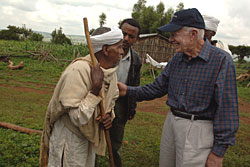
Former U.S. President Jimmy Carter, with Carter Center Board of Trustees Chair John Moores (center) and former First Lady Rosalynn Carter observe a face-washing demonstration by a young Ethiopian girl. A Carter Center delegation toured Mosebo - an Ethiopian village where the Center has worked to eradicate Trachoma - September 15.
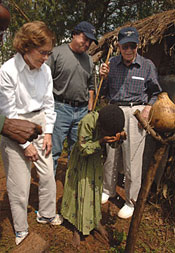
Dr. John Hardman (left), Carter Center executive director, shakes hands with a young Ethiopian.
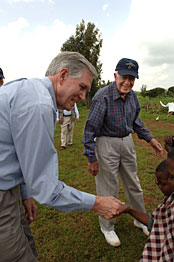
President Carter, with Emory University President James W. Wagner (center), and Carter Center Trachoma Control Program Technical Director Paul Emerson (right), enjoy the welcome presented to the Carter Center delegation.
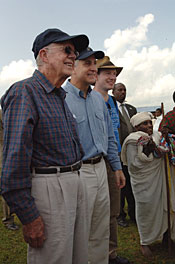
President Carter holds a traditional horsehair staff and wears a special Ethiopian garment, both presented to him by the village of Mosebo.
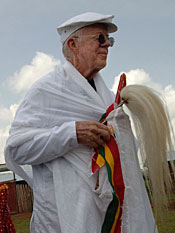
The Carters listen as agricultural techniques in Ethiopia are demonstrated.

Learn more about the Carter Center's Trachoma Control Program »
####
The Carter Center was founded in 1982 by former US President Jimmy Carter and his wife, Rosalynn, in partnership with Emory University, to advance peace and health worldwide. A not-for-profit, nongovernmental organization, the Center has helped to improve life for people in more than 65 countries by resolving conflicts; advancing democracy, human rights, and economic opportunity; preventing diseases; improving mental health care; and teaching farmers to increase crop production. To learn more about The Carter Center and Guinea worm disease, please visit: www.cartercenter.org.
Please sign up below for important news about the work of The Carter Center and special event invitations.